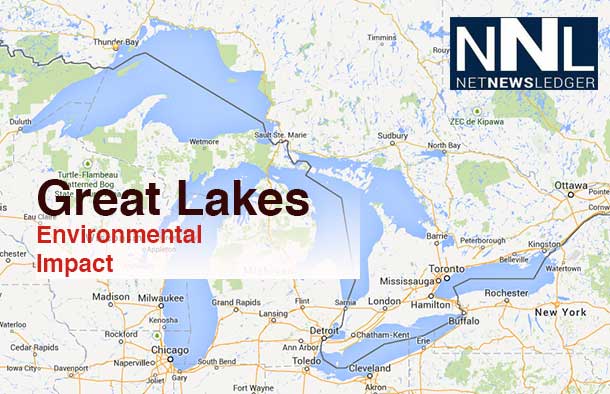
Heads of Great Lakes and St. Lawrence Cities commit to greenhouse gas reductions
Niagara Falls, NY – POLITICS – Today, Nipigon Mayor Richard Harvey and Mayor Jody Davis, joined their fellow elected officials from across the Great Lakes and St. Lawrence Basin as they confirmed their opposition to the City of Waukesha’s application to divert water out of the Great Lakes Basin, as they gathered in Niagara Falls, NY for the Great Lakes and St. Lawrence Cities Initiative’s annual meeting and conference. The mayors are speaking out today in advance of the Compact Council meeting on June 21, 2016 where a decision is expected to be made.
“This is an important decision because it sets a precedent for the future,” said Brad Doff, EarthCare Thunder Bay attending on behalf of the City of Thunder Bay. “If we open this door, it may open the door wide for many other municipalities requesting to draw water outside of the great lakes basin.”
“This may be one of the most significant threats to the great lakes today” commented Mayor Harvey. “Any move to allow diversions of Great Lakes water out of the basin opens the door to future diversions and withdrawals’ of our waters. Being at the head waters of the Great lakes we recognize water as one of our greatest assets and must do everything to protect this great gift we have.”
Racine, WI, Mayor John Dickert said: “There is clear evidence that Waukesha has reasonable alternatives to provide safe drinking water to its citizens, and I do not want to see their effluent contaminate the Root River in downtown Racine. Local government across this Region and in both the US and Canada are calling on the Governors of eight Great Lakes states to reject Waukesha’s application and protect these vital waters we cherish.”
The 123 mayors of the Cities Initiative are also leading on climate change by working with the United Nations’ Compact of Mayors, an international group of mayors brought together by former New York City Mayor Michael Bloomberg, to collectively reduce greenhouse gas emissions that cause climate change. The organization is working towards 50% of its members committed to the Compact of Mayors by the end of 2017 and 100 % by the end of 2019. So far, 20 member cities representing almost 10 million Great Lakes and St. Lawrence citizens have committed to track and reduce their greenhouse gas emissions and others are already proceeding with actions.
“Through this collective action, the Great-Lakes St. Lawrence Region, which represents the 3rd largest economy in the world, is showing leadership in the global fight against climate change” said Mayor Denis Coderre of Montreal, QC, “If we can do it here, we can do it everywhere. We will set a positive example to the world.”
Also at the conference, the Cities Initiative approved a collaborative strategy to reduce phosphorus entering the Thames River through improvements to farmland water management and drainage. The Thames River has been identified as a primary source of phosphorus entering Lake Erie from the Canadian side. The Canadian and US Governments have agreed to reduce phosphorus entering Lake Erie by 40%. Through a partnership with the Ontario Federation of Agriculture and the input from over forty agricultural, conservation, NGO, First Nation, drainage and municipal representatives, the water management and drainage collaborative strategy has been developed to reduce the transportation of phosphorus off farmland, particularly during sudden snow melts and severe storms.
“When Mayors and farmers work together, we can make great things happen,” said Mitch Twolan, outgoing chair of the Cities Initiative and mayor of the Township of Huron-Kinloss, “Our collaborative phosphorus reduction strategy will improve water quality and reduce phosphorus loss from farmland, making a win-win situation.”
Resolutions adopted during the Cities Initiative Annual Member Meeting addressed the threat of Asian carp, microbeads, radioactive waste, drinking water safety, pipeline safety, integrated water management, confined animal-feeding operations, sewer overflows and Phragmites. For more information on the resolutions adopted at the meeting, please visit: http://glslcities.org/communications/resolutions/by-year/.
The Cities Initiative elected Mayor Denis Coderre, of Montreal, QC as chair of the organization, Mayor Paul Dyster of Niagara Falls, NY as vice-chair and Mayor Sandra Cooper of Collingwood, ON, as secretary-treasurer for the coming year.
The Town of the Blue Mountains was awarded the Wege Small Cities Sustainability Award at the conference. The award, sponsored by the Wege Foundation, is given to a community with a population of less than 100,000 as seed money for a Great Lakes and St. Lawrence project that balances economic, social, and environmental aspects and that can be used as a best practice in other communities. The Town of the Blue Mountains received the award for efforts to install solar-powered LED lights in parking lots and other areas in need of illumination around the community.
The Great Lakes and St. Lawrence Cities Initiative is a binational coalition of 123 mayors and other local officials that works actively with federal, state, provincial, tribal, and first nation governments and other stakeholders to advance the protection and restoration of the Great Lakes and St. Lawrence River. For more information, please visit http://glslcities.org/.






